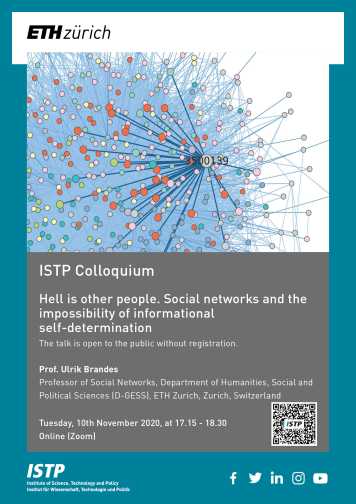Colloquium: Prof. Ulrik Brandes
Tuesday, 10th November 2020, at 17.15 - 18.30
Online (Zoom)
https://zoom.us/j/99029775120
Meeting ID: 990 2977 5120
Hell is other people. Social networks and the impossibility of informational self-determination

Informational self-determination is the authority of an individual to determine disclosure and use of personal data. Meaning and scope of this concept are contested, and the discussion about its implications for privacy regulations is ongoing. The competing interests of individuals and other, notably governmental and increasingly corporate, actors appear to be at the center of this discussion.
In his talk, Prof. Brandes will rather focus on the very possibility to determine disclosure and, as a consequence, use of personal data. Demographic and behavioral regularities facilitate the modeling of personal traits and preferences, which can then be employed to predict actions such as voting decisions and product purchases, or to discriminate individuals in terms of pricing or services rendered. Regulatory attempts to prevent non-consensual disclosure of demographic and behavioral data are therefore of utmost importance. But they are rendered futile in the presence of social regularities that enable the inference of information about an individual without that individual disclosing any of it. Social networks are a case in point.
About Prof. Ulrik Brandes
Ulrik Brandes is Professor of Social Networks in the Department of Humanities, Social and Political Sciences at ETH Zurich. His background is in algorithmics, with special interests in graph algorithms and network visualization. After 15 years as a professor in computer science, he finally gave himself up entirely to his passion for social network science. Methodology and method development in this area are complemented by a growing interest in societal challenges arising from the Digital Transformation.
He is an area editor with Network Science, associate editor with Social Networks, and on the editorial boards of the Journal of Mathematical Sociology and the Journal of Graph Algorithms and Applications. Since 2009, he serves on the board of directors of the International Network for Social Network Analysis (INSNA) as vice-president.
- You can read a summary of the colloquium talk on our Reports webpage.
- You can download the presentation of the talk protected page here (accessible only by ETH members).